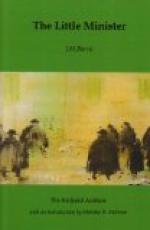“I had thought,” he confessed to me, “that you were one of those who did not like my preaching.”
“You were mistaken,” I said, gravely. I dared not tell him that, except his mother, none would have saw under him so eagerly as I.
“Nevertheless,” he said, “you were a member of the Auld Licht church in Mr. Carfrae’s time, and you left it when I came.”
“I heard your first sermon,” I said.
“Ah,” he replied. “I had not been long in Thrums before I discovered that if I took tea with any of my congregation and declined a second cup, they thought it a reflection on their brewing.”
“You must not look upon my absence in that light,” was all I could say. “There are reasons why I cannot come.”
He did not press me further, thinking I meant that the distance was too great, though frailer folk than I walked twenty miles to hear him. We might have parted thus had we not wandered by chance to the very spot where I had met him and Babbie. There is a seat there now for those who lose their breath on the climb up, and so I have two reasons nowadays for not passing the place by.
We read each other’s thoughts, and Gavin said calmly, “I have not seen her since that night. She disappeared as into a grave.”
How could I answer when I knew that Babbie was dying for want of him, not half a mile away?
“You seemed to understand everything that night,” he went on; “or if you did not, your thoughts were very generous to me.”
In my sorrow for him I did not notice that we were moving on again, this time in the direction of Windyghoul.
“She was only a gypsy girl,” he said, abruptly, and I nodded. “But I hoped,” he continued,” that she would be my wife.”
“I understood that,” I said.
“There was nothing monstrous to you,” he asked, looking me in the face, “in a minister’s marrying a gypsy?”
I own that if I had loved a girl, however far below or above me in degree, I would have married her had she been willing to take me. But to Gavin I only answered, “These are matters a man must decide for himself.”
“I had decided for myself,” he said, emphatically.
“Yet,” I said, wanting him to talk to me of Margaret, “in such a case one might have others to consider besides himself.”
“A man’s marriage,” he answered, “is his own affair, I would have brooked no interference from my congregation.”
I thought, “There is some obstinacy left in him still;” but aloud I said, “It was of your mother I was thinking.”
“She would have taken Babbie to her heart,” he said, with the fond conviction of a lover.
I doubted it, but I only asked, “Your mother knows nothing of her?”
“Nothing,” he rejoined. “It would be cruelty to tell my mother of her now that she is gone.”
Gavin’s calmness had left him, and he was striding quickly nearer to Windyghoul. I was in dread lest he should see the Egyptian at Nanny’s door, yet to have turned him in another direction might have roused his suspicions. When we were within a hundred yards of the mudhouse, I knew that there was no Babbie in sight. We halved the distance and then I saw her at the open window. Gavin’s eyes were on the ground, but she saw him. I held my breath, fearing that she would run out to him.




